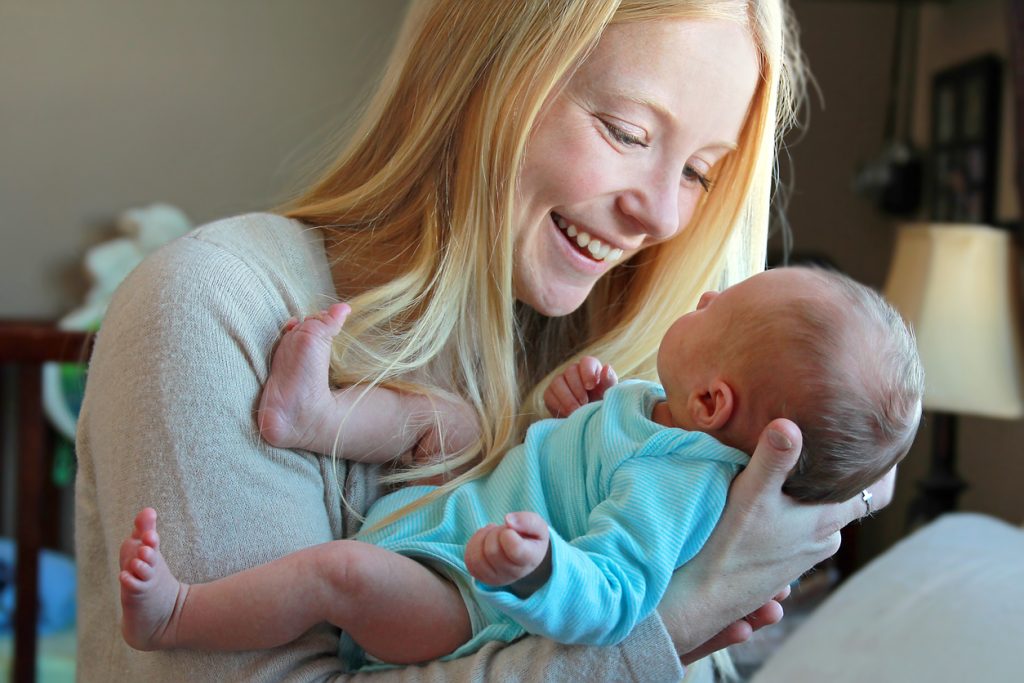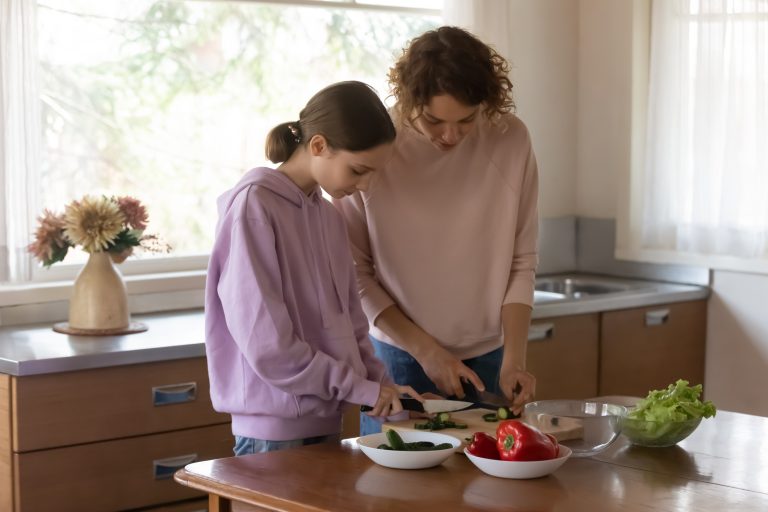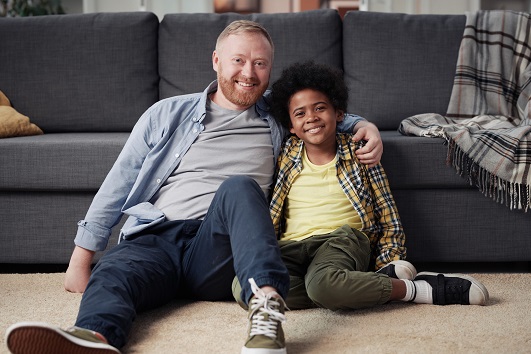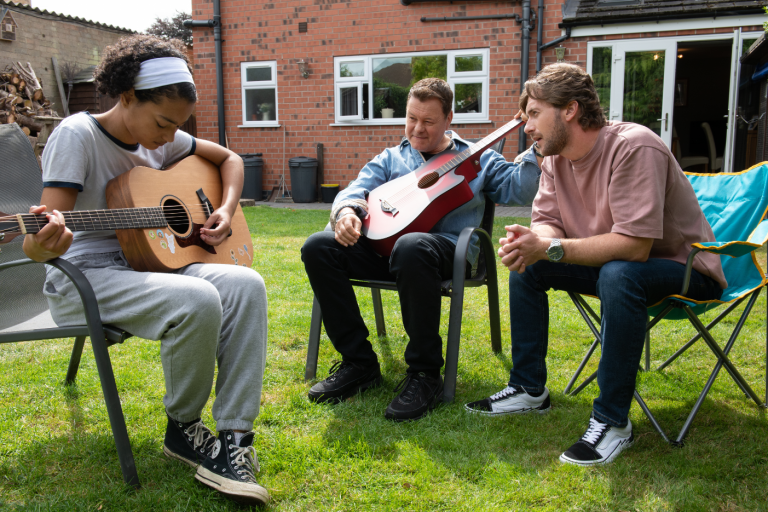South Glos Foster Carer, Lucy opens up about her life as a parent and child foster carer. She tells us about why she became a parent and child foster carer, the experiences she’s had along the way and what’s involved with this type of fostering.

Why did you want to become a foster carer?
I wanted to be a Foster Carer from my early twenties because when I was a child I experienced bullying from the beginning to end of schooling and also experienced an abusive relationship; so I wanted to give the chance to families to have the best start in life, with the skills needed to thrive.
I also wanted to make a difference to children so that they could trust adults and have a better childhood.
How did you get into parent and child fostering?
I wanted to wait until I’d had my own child so that I knew what being a Mum meant. My daughter was two and a half when we had our first foster child, a 12-year-old boy who was with us for two years. We also had nine emergency placements of children of all ages.
What became clear was that our daughter wasn’t ready for other children near her age to be in the home with us. We tried teenage fostering which worked for a bit, but then that also got complicated with our daughter’s needs.
Our social worker said our house and our approach was well set up for parent and child fostering. While we were thinking about how it would impact Emily, a placement came up, so we decided to give it a go.
How was your first parent and child fostering experience?
We loved it and our daughter really loved it, so it gave us a big confidence boost. It was nice to be able to get in early to support the baby and provide guidance for the Mum. It went so well we decided to continue and are now on our fourth placement.
What’s the process for preparing for a parent and child coming to live with you?
Our social worker contacts us to say they’ve got a parent or parents that need support. There are various reasons why they may need support. This arrangement gives them a chance to show what skills they have and whether they’re willing to take guidance, which makes for a successful placement.
If we think we can support them we will have a placement planning meeting, where we go through the house boundaries, social services rules and what’s expected from them.
Normally there will be a trajectory of what will happen over a 12-week placement to achieve a successful parenting assessment.
What support does a parent need in parent and child fostering?
Each placement can be different depending on the specific needs of the parent and child.
It can involve a high level of support where you are with them consistently, the baby sleeps in your room at night and you’re doing night feeds and most of the baby’s care initially.
A more mid-range arrangement would be where they aren’t supervised constantly, you just need to be listening out and having check-ins.
There is also a looser arrangement where they can be unsupervised out of the house, and they have to check-In – it can be very varied.
We’ve done four placements and they’ve all been very different which keeps you on your toes.
How long is a parent and child fostering arrangement?
It depends on the placement. There is normally an initial plan in place for around 12 weeks and you then take it from there depending on how it’s going. We’ve had placements from six weeks to 10 months, averaging around three months, all with different outcomes.
What’s your role as a parent and child foster carer?
For the higher-support placements, I would be the main carer for the baby and the parent would observe me doing care tasks like feeding, changing, getting them to sleep and burping them, so they get into the swing of what they should be doing.
At some point I’ll take a step back and ask them to show me what they can do and what they’ve learned. We’ll go very slowly like this and once they’ve picked up one task we move on to the next until they’re confident or able to do it themselves.
Sometimes we’ll ask for support from Social Workers or Health visitors to help boost their skills, other times I can just observe and only step in if I have a concern.
It can be intense if you’re doing the parenting until they’re able to do it for themselves. Other times you may just be offering guidance if they ask for it or stepping in if there is an issue.
The level of my involvement is decided before they come to me so I know what’s expected, but that can change if something is, or isn’t, happening.
What have you learned from being a parent and child foster carer?
I have learned that everyone’s parenting styles are very different and different doesn’t always mean wrong. It can just mean something needs to be tweaked to make it safe.
Cultural and religious differences, or just the way that the parents are brought up themselves can have a massive impact on the way that they want to parent, or how they choose to parent.
I’ve been in situations where I have needed to lower my standards and let things go, as long as it is not posing a safeguarding issue and is simply differences in approach.
What’s the most challenging thing about being a parent and child foster carer?
We’ve had a couple of placements that have had little or no English, so we’ve had to work through Google translate and that is very tricky because it’s not reliable.
We’ve had to interpret what messages mean because many English words aren’t in other languages. You also need to make sure you word things in a constructive way like “what would be really great for your child…” so it’s not taken as criticism.
Night feeds are hard when you have to get up and watch the parent do something they’re not willing to stop, or if they’re not willing to engage or take the advice. You just really need to focus on what the baby needs in that time rather than escalating the situation.
What’s the most rewarding thing about being a parent and child foster carer?
More than half of the parents we’ve helped have come back and said they’ve really appreciated the support and guidance we gave, and that we’ve helped them keep their baby, or improve their skills or build their confidence.
I really like being able to make sure that the child gets the right outcome at the end of the placement. Being able to observe and record progress helps make sure the outcome is the best for all concerned is a rewarding of my role.
I think what I like most about it is that I can feel confident I’ve done what I can for that child.
We really enjoy it. We’ve got the means to be able to do it. Every day we’re learning and it’s good for new social opportunities and learning about the world.
Do you have any advice for anyone considering become a parent and child foster carer?
Speak to your local fostering team, or your supervising social worker if you’re already fostering. From there you can find out more and attend a training course.
It can be very intense and there are last minute changes where you’re not sure what’s about to happen, but if you’re up for a challenge and enjoy improving other people’s wellbeing, it’s definitely worth a try.
It can be quite an invasive arrangement as opposed just fostering a child as you’ll have the parent or parents living in your home. You need to make allowances for that and understand that you might not always get on as people, but you still need to be respectful and manage a positive relationship to make sure the placement works.
Your observations need to be neutral; you must write what you can see in front of you very black and white. You need to let the parent or parents know what you’ve observed and recorded and give them the opportunity to reflect and respond. It needs to be really accurate from all perspectives so it’s fair and really clear around what needs to be changed or improved.
Make sure you’re up to date with current NHS guidelines for babies and children because that’s the only advice you’re allowed to give. You need to have experience with children of that age, and it helps if you have a therapeutic approach.
It’s a really fulfilling role to be able to support these children and hopefully help the parents to be the best that they can be.
What do you do when you don’t have a parent and child living with you?
We take a little break. It’s good to reset as a family and take some time to be able to do what you want to do when you can because when you have a placement, you need to work your life around their commitments. You’re busy attending meetings or managing childcare, so it’s very nice to be able to take time for yourself.
We also take time to reflect on what went well, what we think we wouldn’t want to have to manage again, or what we need to change. Then, we will be back open for another parent or child, but we’re also open for teenagers over 16, it very much just depends on the situation.
If you’d like to find out more about parent and child fostering, or other types of fostering, fill in our contact form and we’ll be in touch.



